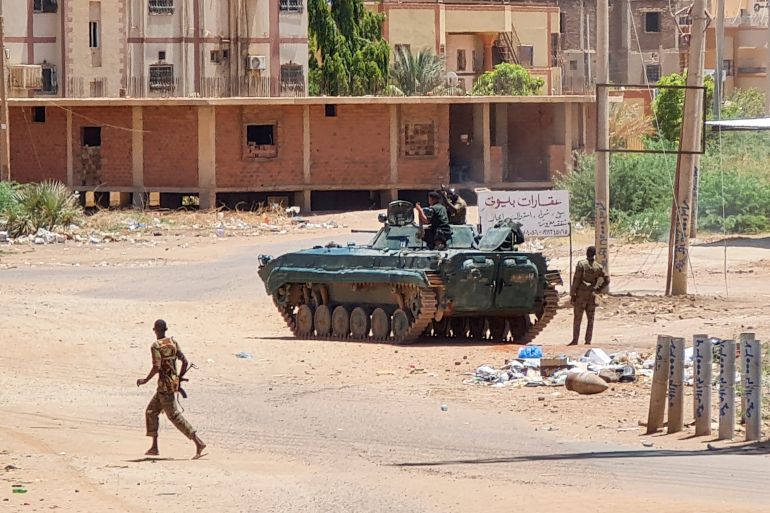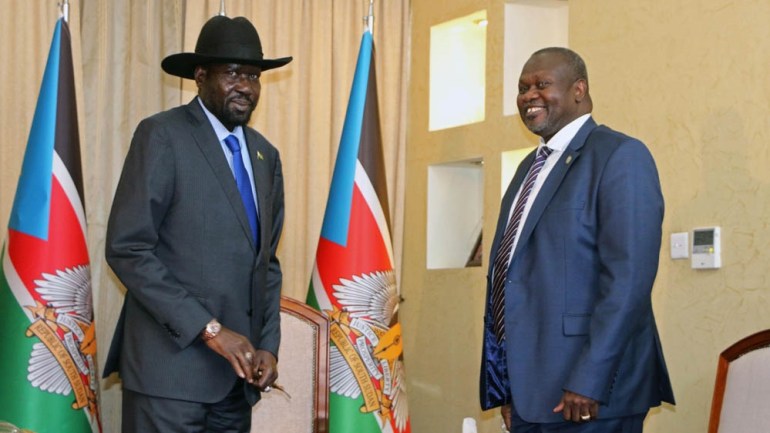Clouds gather over South Sudan as battles rage next door
Fighting between Sudan’s army and RSF could upend South Sudan’s shaky peace process due to oil exports and demographic concerns.

South Sudan is still recovering from years of a ruinous civil war, but now trouble next door risks fuelling another descent into turmoil.
Analysts said the fighting between Sudan’s army and a paramilitary group called the Rapid Support Forces (RSF) could upend the shaky peace process in neighbouring South Sudan due to possible oil flow issues and demographic concerns.
Keep reading
list of 4 itemsWhy are nations racing to buy weapons?
US Senate passes Ukraine, Israel, Taiwan bill; Biden to sign on Wednesday
Post-1948 order ‘at risk of decimation’ amid war in Gaza, Ukraine: Amnesty
South Sudan split from Sudan in 2011, yet the two countries’ fates are still closely linked.
“The common view from the street is that the collapse of the state in Sudan will extend violence to South Sudan,” said Edmund Yakani, an expert on South Sudanese affairs.
South Sudan’s civil war erupted in 2013 between soldiers loyal to President Salva Kiir and rebel forces led by his deputy, Riek Machar. Five years later, the two rivals inked a peace agreement to end the war, which had killed an estimated 400,000 people and displaced millions. The peace process is supposed to culminate with an election next year although experts are sceptical it will take place.

Now, South Sudan risks an economic catastrophe and renewed conflict if its vital oil exports, which flow through Sudan, are damaged or disrupted by battles between the Sudanese army and RSF, analysts told Al Jazeera.
Nearly as troubling is the return of thousands of South Sudanese refugees who had sought asylum in Sudan during the civil war. Their return could lead to renewed local conflicts due to land and demographic disputes.
The grim prospect of violence spreading across one of the world’s poorest regions has prompted South Sudan to launch efforts to mediate the Sudan conflict, which broke out on April 15. On Wednesday, the South Sudanese government called on the Sudanese army and RSF to send delegates to its capital, Juba.
South Sudan has relationships with Sudan’s top army commander, Abdel Fattah al-Burhan, and RSF leader Mohamad Hamdan “Hemedti” Dagalo, but South Sudan has little leverage over either one.
“The best option for South Sudan is to remain neutral,” said Daniel Akech Thiong, a South Sudanese expert and the author of The Politics of Fear in South Sudan.
“They can’t benefit if they are seen as taking sides with either of the two generals because it is too risky for them, but [we] can’t always count on rational politics,” he warned.
Oil money
According to an International Crisis Group report from 2021, the revenue generated from South Sudan’s lucrative oilfields is delicately holding the national unity government together, thanks to regular payouts to loyalists of Kiir and Machar.
But due to its reliance on its neighbour to export oil to international markets, South Sudan’s biggest fear is that its frail transitional government in Juba – and its peace process – could crumble if oil pipelines running through Sudan are disrupted.
Oil accounts for about 90 percent of the deeply impoverished country’s revenues and 70 percent of its gross domestic product, according to a World Bank report. Juba pays Khartoum fees and a non-commercial tariff to export its oil to international markets. It is now unclear who gets that money.
“If [oil pipelines] in Sudan get disrupted, then I don’t think Kiir’s regime lasts a month,” Joshua Craze, an independent researcher on South Sudan, told Al Jazeera. “He’s in a system of transactional politics that includes regular payoffs to people across the country.”
“What makes it really scary for South Sudan is that the official opposition is so embedded in the same system, … so you won’t see an opposition rise up,” he said. “I think you’ll see a general breakdown of authority. What that will mean is conflict around the country.”
Yakani – who is the executive director of the Community Empowerment for Progress Organization, a non-profit focused on peace and conflict mediation – agreed that any prolonged disruption of oil exports will generate unrest.
“The government won’t be able to provide any security or protection,” he told Al Jazeera.
Tense return
Elections are scheduled in South Sudan in December 2024, but the United Nations said in March that the country still did not have the civil space and security arrangements required or an independent electoral commission.
Having made little headway in preparing the ground for a free and fair national vote, the government appears more focused on campaigning as it looks to secure a number of political strongholds, Craze said.
The return of tens of thousands of South Sudanese exiles is also a challenge for the government. The halt in cross-border trade has spiked food prices in the already food-insecure country, especially in border regions where many returnees have settled.
The larger issue for the government, which may be eager to consolidate power through a national vote, is that returnees could also tilt the ethnic demographics in certain states. That could influence an election, said Craze.
“The returnees threaten to destabilise very tense areas from which they were displaced … if they are indeed allowed to move back there,” he added. “If they are not allowed to move back, then we have a case of population engineering where the government is basically arbitrating who gets to move back [to their lands] and who doesn’t and [thus] who gets to vote in their areas of origin and who doesn’t.”
Thiong added that South Sudanese returnees might also bring with them different political perspectives after witnessing Sudan’s sprawling pro-democracy movement, which has sustained itself since 2019.
“South Sudan is not ready to receive these people, to make them feel welcome and to give them basic necessities,” he said. “[South Sudan] is getting newcomers from a country that has been through uprisings, … so what may have been a dormant demand for change in South Sudan could easily be awakened again.”